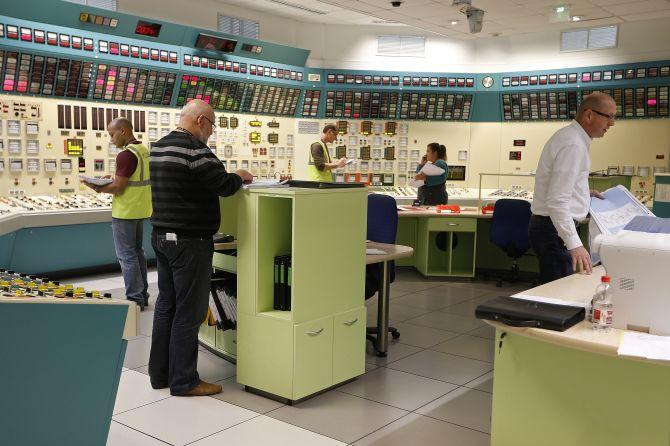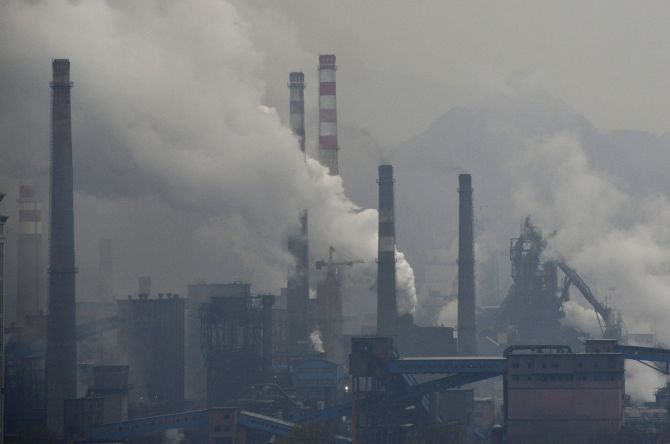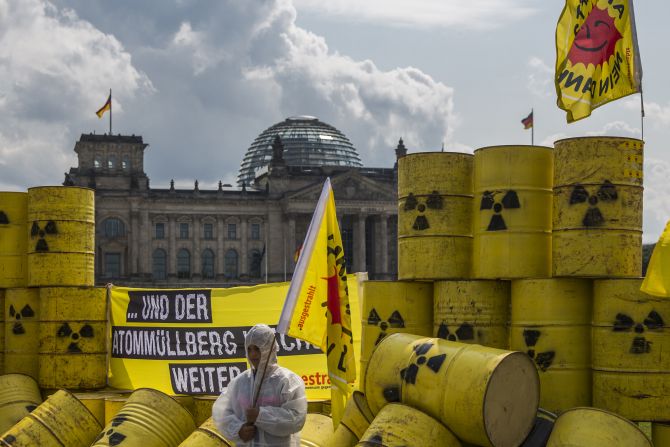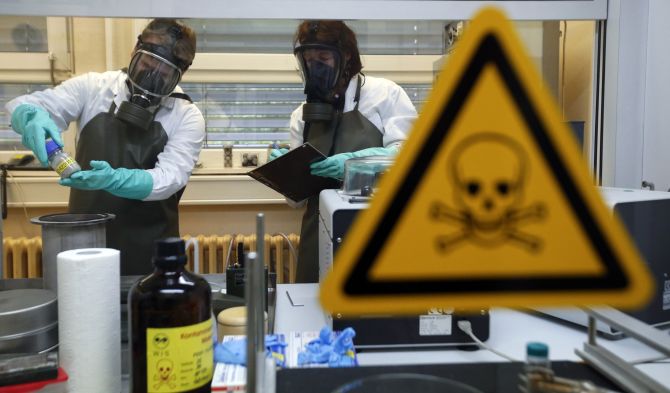
'We need abundant affordable clean energy to help lift out of poverty the remaining part of humanity that is still living in poverty. I don't see any other viable candidate on the scene for doing that except advanced generation nuclear power,' Dr James Hansen, former head of the NASA Goddard Institute for Space Studies, tells Rediff.com's P Rajendran.
Dr James Hansen has been a stout opponent of energy based on fossil fuels and has warned that it is well past the time to cut down on the carbon dioxide they produce, thus contributing to climate change.
The former head of the NASA Goddard Institute for Space Studies in New York City, and adjunct professor at Columbia University, Dr Hansen had taken up cudgels against his own agency administrators for trying to censor his views on climate change; against political administrations, including those of Presidents George W Bush and Barack Obama for not doing enough to address the problems associated with carbon dioxide emissions.
He has been arrested three times for protests against the Keystone oil pipeline extension from Canada. He has also expressed his distrust of cap and trade, the use of emission permits that can be traded to try and bring pollutants released down to manageable levels.
Among other honours, Dr Hansen has been recognised by the National Academy of Sciences for his analyses of climate change data, and by the American Association for the Advancement of Science for honestly communicating scientific opinions on matters of public importance.
Foreign Policy has declared Dr Hansen one of its Top 100 Global Thinkers for his work arguing for climate change.
 Among other things, he was one of the chief advisers to former US vice-president and Nobel Prize winner Al Gore during the making of his documentary. He has also co-authored a book, Storms of My Grandchildren, about the catastrophe climate change means to the world.
Among other things, he was one of the chief advisers to former US vice-president and Nobel Prize winner Al Gore during the making of his documentary. He has also co-authored a book, Storms of My Grandchildren, about the catastrophe climate change means to the world.
Dr Hansen, left, has also been arguing for nuclear energy as a safer option than either coal or renewable energy sources like the sun, wind, biofuels, etc, in the immediate future.
In a recent open letter (external link), he and three other researchers, Ken Caldeira, Kerry Emanuel and Tom Wigley, called for the world to rely on safer nuclear power systems to reverse climate change.
The letter argued that while renewable energy would be useful in the future, currently it cannot scale up fast enough to meet the threat of climate change poses.
According to the letter, 'We understand that today's nuclear plants are far from perfect. Fortunately, passive safety systems and other advances can make new plants much safer. And modern nuclear technology can reduce proliferation risks and solve the waste disposal problem by burning current waste and using fuel more efficiently.'
'Innovation and economies of scale can make new power plants even cheaper than existing plants,' the letter noted. 'Regardless of these advantages, nuclear needs to be encouraged based on its societal benefits.'
In an e-mail interview with Rediff.com's P Rajendran, Dr Hansen was passionate and truculent by turns.
Kindly ...

Going by your letter, do you believe that the problems caused by climate warming far offset the dangers of weakly regulated nuclear power plants, Fukishima being just one example?
Nobody would build a Fukushima power plant today.
We should compare alternatives for the future. The air pollution from fossil fuels kills far more people than the worst nuclear technology of the past, the most weakly regulated nuclear technology.
By the way, Chernobyl was basically a weapons factory, not a power plant -- it did not even have a containment structure to prevent release of radiation.
But even if you blame Chernobyl on nuclear power, the overall safety of nuclear power is better than that of any of the other energy sources.
If an airplane crashes and kills several hundred people, we do not say 'No more airplanes.' We improve aircraft technology. Airplanes are now quite safe, safer than driving a car or riding a bicycle. The same is true for nuclear technology.
We have much improved nuclear technology. Even with the old technology, the nuclear industry was the safest major industry on the planet.
Why focus on the small number of people killed by old nuclear technology when thousands of people are killed every day by air and water pollution from fossil fuels?
Going by your data, coal provides 40 percent of the energy the world uses, while both nuclear and clean energy options contribute around 15 percent.
Would it be faster to scale up smaller and cheaper units using energy from the sun, wind, water flow, bio-fuels and other options, all of which don't contribute as much to climate change?
Is the lack of time to address the problem time the main factor here?
Why do you say nuclear and clean energy options? Are you saying that nuclear power is not clean?
It is important to pay attention to science, not just listen to propaganda from the anti-nuclear religion. The 'renewables' (solar, wind, geothermal, biofuels) provide two percent of global energy.
With the subsidies over the past 30 years, and laws in some countries and states that require utilities to get X percent of their energy from renewables, they now provide 2 percent of global energy.
This is less than or about equal to the annual GROWTH of energy use and CO2 emissions. Renewables cannot scale up fast enough to provide for energy needs.
We need abundant affordable clean energy to help lift out of poverty the remaining part of humanity that is still living in poverty.
I don't see any other viable candidate on the scene for doing that except advanced generation nuclear power, a combination of 3rd generation and 4th generation (fast reactors, which can burn nuclear waste) nuclear power plants.
Why do you believe clean energy cannot be scaled up fast enough? Is there not some evidence that solar panels prices, for example, have dropped precipitously over the years.?
Surely you are joking. Clean energy, -- nuclear energy -- could be scaled up fast enough. The potential exists now to build modular nuclear reactors in a factory, in assembly line fashion.
Once there is an approved design for such a modular reactor it will be possible to rapidly replace first coal and then gas power plants.
This is the best hope for moving us off our fossil fuel addiction and providing plentiful energy to those societies that are presently energy-starved.
Kindly ...

After Hiroshima and Nagasaki, nuclear energy has always been viewed a little warily. The Three Mile Island, Chernobyl and Fukishima mishaps have done nothing to attenuate that perception.
In India, for example, there have been multiple reports of leaks. Given the political and logistical hurdles, would it be quicker and cheaper to clean up coal energy, as called by Christiana Figueres, head of the UN's Climate Change Secretariat?
You are conflating nuclear war and peaceful use of nuclear power, the sword and the plowshare.
Besides mortality rates immediately ascribable to fuel production, is there not a danger from low-grade, long-term effects of radiation, including the increased prevalence of cancers in people enduring even moderate amounts of radiation?
What are the passive safety systems and waste disposal techniques that can help reduce the danger, given that radioactivity tends to last millennia?
The scientific evidence does not support the assertion that low-level radiation is harmful. Again, the nature of your question suggests that you are informed by anti-nuclear propaganda, not by science.
If the number of nuclear plants increase across the world, is there not a problem of regulation that can creep in? How can that be addressed?
Nuclear power in the past has been the safest large-scale industry on the planet -- there are good reasons to believe that in the future it will be even safer.
Kindly ...

What about the danger of dual use? If everyone else begins using nuclear energy as the standard, would it be unfair to deny it to entities in unstable nations or those with dubious intent?
Any nation with nuclear technology must allow international inspections.
It is not difficult to detect when a rogue State is trying to use nuclear technology to make weapons. That is a problem when it occurs, but peaceful use of nuclear power does not increase that danger.
There are easier ways to make nuclear weapons than from use of power plants.
India has been getting coal comparatively cheaply, even at the cost of social unrest over the way it gets it. But there has been strenuous resistance to nuclear plants there, too.
How can those concerns be addressed in time to do something about climate change?
Are there safer nuclear plants you believe can be online in time -- based on thorium?
Safe nuclear technology exists today.
Do you believe, that like most clean energy, fusion energy is not going to be viable in time to significantly impact the worst effects of climate change?
Certainly not -- we are nowhere near having useful fusion energy.
Are there other issues that you think that needed to be addressed here, ones we have not touched upon as we should?
Have you seen under a microscope the organic carbon and black soot particles produced by burning fossil fuels? These are about as ugly as anything. These submicron particles enter not only your lungs but your blood stream.
Yet somehow these terribly ugly particles that kill thousands of people a day do not bother you, while leaks of radiation at a level that, from dilution, becomes harmless far away from the source seems to worry you greatly.
It makes me wonder: Do you hate science? Did your mother beat you with a stick and say this stick is science? I'm just kidding, but it is bothersome that you seem to have swallowed a lot of anti-nuclear propaganda.